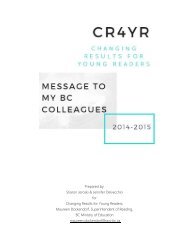Teacher
2015%20Nov-Dec%20Teacher%20low%20res
2015%20Nov-Dec%20Teacher%20low%20res
You also want an ePaper? Increase the reach of your titles
YUMPU automatically turns print PDFs into web optimized ePapers that Google loves.
My experience as a queer non-binary person in school has not been easy. High school<br />
in general is not easy, but being undeniably different doesn’t help.<br />
Coming out as queer has been pretty positive; coming out as non-binary, on the<br />
other hand, has been met with some difficulties. Firstly, the washroom situation<br />
isn’t great. While we do technically have a non-gendered washroom, it can only be<br />
accessed with a teacher’s master key. So, whenever I need to use the washroom, I<br />
end up missing a fair amount of class time going back and forth from where the key<br />
I have access to is located, to where the washroom is located.<br />
Another issue I’ve found is with general visibility; assemblies tend to address the<br />
school with “ladies and gentlemen,” and documents like the dress code are largely<br />
separated based on gender. Security checks before dances are also divided in this<br />
manner. It makes it uncomfortable for me, because I have to decide which category<br />
to put myself in (although I’m fairly certain if I went in the boys’ line I would be<br />
asked to move).<br />
Finally, my pronouns have been met with some reluctance. While I have had some<br />
great reactions, I’ve also had some not-so-great ones, like my drama teacher telling<br />
me “if it’s not offensive, [he’s] not changing.”<br />
If you work in a school and have an LGBTQ+ student, one of the best things you<br />
can do is accept them. Support from teachers is huge. If a student asks you to use a<br />
different name or different pronouns to refer to them, do it without grilling them<br />
on their reasons. Make your classroom a safe space by shutting down offensive<br />
language—not just homophobia or transphobia, but also sexism, racism, ableism,<br />
etc. It will mean a lot to your students and make school better for everyone.<br />
Dani, 17 (they/them)<br />
Being LGBTQ+ makes high school a lot more<br />
difficult, especially for trans kids. That’s the<br />
big thing. There’s a lot more things we have<br />
to be careful about, and being ourselves is not<br />
always the safest option, especially in a place as<br />
judgmental as high school. Puberty is happening,<br />
and it’s hard enough already without having<br />
dysphoria, or the overbearing “something is<br />
wrong with my body,” feeling on top of it. I’m<br />
lucky enough to attend a school with such a<br />
strong, confident LGBTQ+ presence that there<br />
isn’t a lot of blatant homo/transphobia because<br />
people respect my identity. It definitely makes<br />
things easier, but that doesn’t stop me from<br />
having a lot of anxiety and stress about being<br />
myself while at school. There is the whole<br />
situation with my birth name being different,<br />
there’s also washrooms I have to worry about,<br />
change rooms, and there’s so many more things<br />
that I need to worry about in order to feel<br />
safe and comfortable in my body, and in my<br />
environment. Sometimes my school work isn’t<br />
my priority because of all the other things I have<br />
to worry about. It’s the same for a lot of my trans<br />
friends that are still in school. To help us, it’s not<br />
that hard. Just respect our identities, do your<br />
best to understand terminology, and use our<br />
names and pronouns so we can<br />
focus on learning.<br />
Everett Montinola, age 17<br />
Genderqueer/nonbinary<br />
They/Them<br />
Moscrop Secondary, Burnaby<br />
November/December 2015 TEACHER 17



